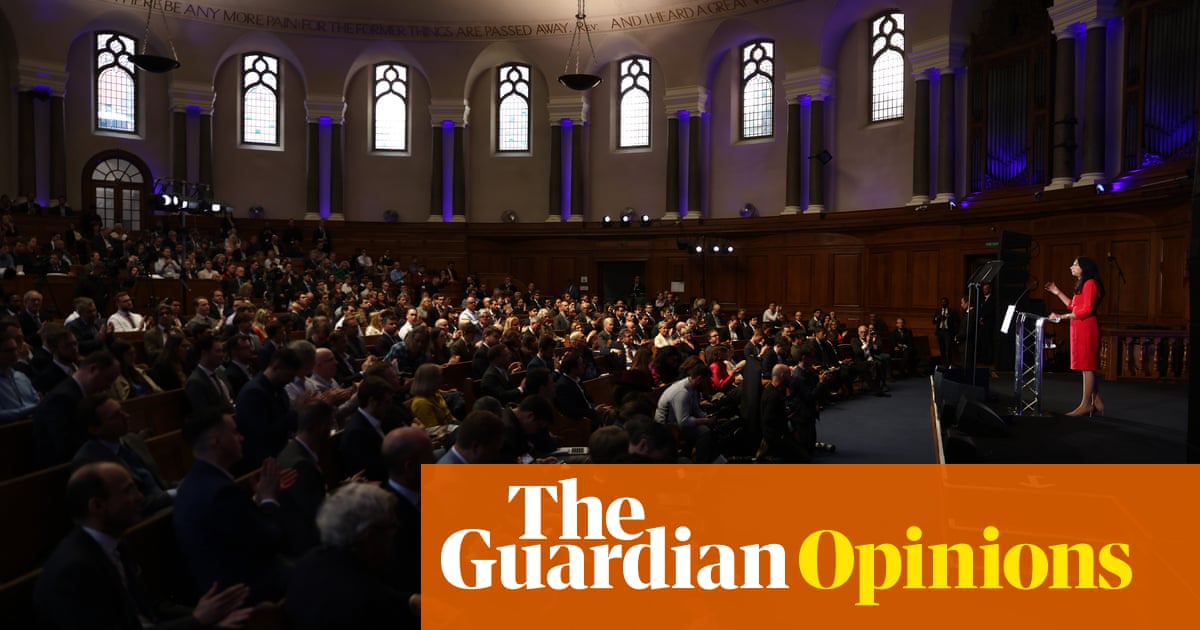
On the seafront at Clacton there is a variety of nostalgias to choose from. The advertising boards for the Princes theatre offer tickets to “80s Live” while the West Cliff promotes “Sounds of the Sixties”. Tickets for the present and the future do not seem so readily available.
On Thursday morning, a different kind of history lesson was about to begin. In the memorial garden behind the revamped pier (address: “No 1, North Sea”) the D-day commemoration service was scheduled for 11am. Two dozen veterans from different conflicts assembled to say a prayer for the fallen; the solemn two minutes’ silence was punctuated by the cry of gulls and the whining of power tools from nightclub renovations across the road.
Afterwards, the talk among the old soldiers was of the coming battle for these particular beaches. Nigel Farage was not in attendance here – he was taking the opportunity to pose in military vehicles in Normandy. But last Tuesday he had staged his own familiar end-of-the-pier show. That announcement of his candidacy ended with the suitable slapstick of a milkshake chucked by a woman that the BBC identified “as a fan of Jeremy Corbyn and an OnlyFans model”. A couple of days on, in Clacton, the reviews were still coming in.
In a straw poll of veterans, Farage’s campaign message seemed to be getting through. Jason Stewart was in a green beret and a biker jacket studded with medals; after a long career in the Royal Marines, he “thought it was time to get out after I was blown up twice in one day in Afghanistan”. He offers a version of an argument heard all day. “The two main parties look both the same to me,” he says. “The Tories don’t care about us. And Labour say they will reopen prosecutions of soldiers who served [in the Troubles] so that’s a no-no. Farage and Reform seem like the only option.”
Up the road, meanwhile, opposite McDonald’s, there was an alternative display of army jeeps and vehicles alongside veterans in fatigues. The display was organised by David Bye and his partner, Linda Hazelton, who run a charity delivering homemade pie and mash to needy veterans around the town. Bye had a one-to-one chat with Farage when he visited and claims he was given certain commitments, which will remain between them.
He grew up here; he remembers earning pocket money as a kid running tourist luggage down busy streets to Butlin’s. It’s been a long decline, he says, since the holiday camp went. “I thought I’d seen it all,” he says. “But the other morning I saw a long queue of blokes on bikes waiting for McDonald’s to open. They were collecting takeaways for people who couldn’t be bothered to make breakfast for their kids.
“I don’t know where you start with some of that,” he suggests. “But I think Nigel gets it.”
Just along the coast from the centre of town – beyond the site once occupied by Butlin’s, now marked by a heritage plaque – is Jaywick, a collection of ad hoc 1930s chalets, now permanent homes, that has been widely identified as the poorest council ward in Britain. The second part of Farage’s campaign launch took place here, at the Three Jays pub.
The place holds symbolic relevance to Farage. Exactly a decade ago, under his Ukip brand, a meeting here paved the way for that party’s only Westminster election success, for Douglas Carswell. If you were to define the moment that Brexit became a possibility, and then a reality, you might begin there. Nine hundred people showed up, many of whom had not previously taken any interest in national politics. In the course of their populist pitch, Carswell and Farage quoted liberally from a Times newspaper column the previous week written by Matthew Parris.
Looking back at that column a decade on, you can see in it all the faultlines that were exposed and exploited so cynically by Farage and Brexit, the roots of the crisis that threatens to destroy the Conservative party in this election (a humiliation from which Farage, inevitably, hopes to benefit).
Parris, in his waspish style, on a visit to Clacton in 2014, had declared its irrelevance to modern Conservatism: “This is tracksuit-and-trainers Britain, tattoo-parlour Britain, all-our-yesterdays Britain,” he wrote. He asked his party a question which would now get a very different answer: “Is this where the Conservative party wants to be? [Or] do we need to be with the Britain that can admire immigrants and want them with us, that doesn’t want to spend its days buying scratchcards?”
Parris insisted that he was not “arguing that we should be careless of the needs of struggling people and places such as Clacton. But I am arguing – if I am honest – that we should be careless of their opinions.”
If the following couple of years proved anything to the Tory party, it was that the people Parris caricatured were not prepared to be abandoned in that way, and that collectively – at least in the months of the EU referendum – they had a voice. Clacton produced the second largest majority for Brexit, and that vote was directed as surely against that metropolitan arrogance as towards Brussels.
A decade on, despite everything, many people here still seem prepared to listen to Farage, because for all the government promises of levelling up, their lives have only got harder. And of course Farage, ever the chancer, has seamlessly replaced one imaginary scapegoat for all those issues – EU bureaucracy – with another: desperate asylum seekers on small boats. Clacton has a population that identifies as 96% white British. But still, talk to many people here about politics and mass immigration is the issue that frequently comes up.
After Carswell’s election, Jaywick attracted a grim kind of poverty tourism; the Channel 5 series Benefits by the Sea sought out extremes of deprivation. That exposure strengthened a kind of off-grid defensiveness in the community here, though. The next time a documentary crew came – led by media personality Jodie Marsh – she was pelted with eggs and run out of town.
Barry and Suzy Shimell featured in that Channel 5 programme and were disgusted by the way it was edited. This morning they have set up a little stall selling bric-a-brac for charity outside their house, which fronts the beach. They used to own hotels in town and love it here, though the community is not quite what it was since the pandemic. But the problems, they suggest, come from outside rather than within. There is talk of a dinghy that washed up here on the beach a while back – empty of people but full of clothes and bits and pieces. “We knew exactly what that was,” Suzy says. Don’t get them wrong, they say – they’d help anyone. But they like the idea of Farage telling it like it is.
Scratch the surface and you hear something of the same story from different quarters. In recent years, partly shamed by the coverage of Jaywick, the local Tendring council has come up with a plan to develop the area. Investment worth £120m has been mentioned. The first evidence of this is Sunspot, a market hall and shared workspace that won a recent design award and is something concrete in a place that seems alarmingly precarious and temporary.
In the cafe, Marlene Fox and Christine Beiley, who are on holiday with their mum, can’t get over how much it has improved since they lived here. “Ten years ago, you wouldn’t have left your car here. You’d walk round the corner and when you came back all that would be left is the steering wheel, if you were lucky.”
They are, nevertheless, still gutted to have missed Farage on the pier. “We’ve got to start looking after our own people,” Beiley says, repeating another mantra.
And then, of course, you find anomalies. Barry Dawson, 75, is walking his neighbour’s chihuahuas. An “old hippy”, he moved “to the badlands” here from the East End of London, 30 years ago, did a sociology degree, brought up kids and grandkids, worked in children’s homes, never looked back. He is cheerfully scathing of the “Romford talk” of some of his friends and neighbours, and he has no truck with Farage. “I’m an old union man,” he says. “Corbyn wasn’t left enough for me. Farage has got nothing at all to say to people here – but I’m not sure Starmer has either.”
What Farage can rely on is recognition. Miguel Buron, 31, who is riding a fat-wheeled electric bike up and down the boardwalk, has not long moved to Jaywick and is looking for a job. (What work is he after I wonder? “I’ve always wanted to work in an undertaker’s,” he tells me.) He looks blank when I mention Brexit, as if hearing the word for the first time, but he knows Farage well enough. “He was here, he seems like a good thing,” he says.
It’s an enthusiasm shared in other unlikely places. The most deprived quarter of Jaywick is Brooklands. Wander along those part-derelict streets, though, and you come across an isolated little oasis of a shop, the Little Curiosity Spot, run by a Brazilian expat, Ieda Lima-Boswell, and her husband, John. Lima-Boswell hand-paints designs on vintage clothing and sells arts and crafts made by local residents. She and her husband moved here from Biarritz in France three years ago, because they wanted a bit more of an adventure in their retirement.
Boswell-Lima talks of the warm welcome they have received, and the creative spirits she is trying to ignite locally. Surely she isn’t taken in by Farage? She points to a Reform poster proudly displayed above the desk where she paints. “I’m so sad I missed him the other day!”
The people I speak to have less to say about Labour’s candidate, Jovan Owusu-Nepaul, fresh from a politics degree at Cambridge, and Giles Watling, the Tory (who once played the vicar in “Bread”), who is defending a thumping, but now precarious majority.
Some of the social problems are so intractable here that you suspect that many concur deep down with the heckler at the Wetherspoon’s pub on Tuesday, who – when Farage paused to ask “What do I have to offer Clacton?” – shouted “Fuck all!” Still, as the theatre posters suggest, in the absence of a clear future, the attractions of historical re-enactment are seductive.
In this regard, of course, Farage could not have scripted a better scene for himself than the spectacle of a Tory prime minister leaving the D-day celebrations early. Tragically, as this week is proving, the forces that made his bleak and divisive message relevant in 2014 have not gone away, and in the weeks to come you suspect that Westminster political parties will still ignore Clacton at their peril.












